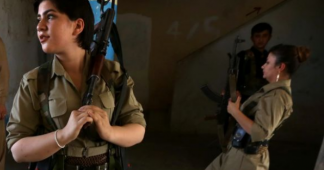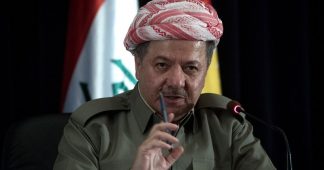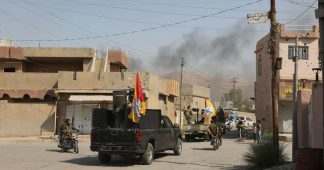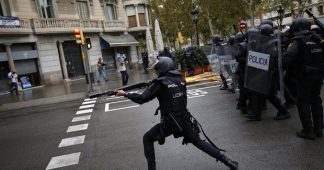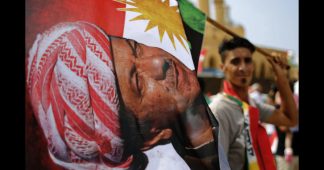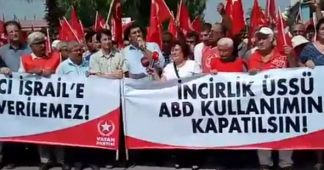By Earl Bousquet
What each case demands – if not too late – is urgent stepping back from the brink, a necessary pull-back from the precipice of armed conflict in common pursuit of conflicting goals – if only to rethink once more, before again plunging headlong into fights that can cost more and last longer, in all their negative respects.
The first clear shots have been fired.
The Catalan and Kurdistan conflicts have metamorphosed into military operations and war-talk by central governments in Madrid or Baghdad and threats to crush independence aspirations clearly expressed in elections that neither administration recognized – and the Spanish and Iraqi governments are both hitting-back hard to suppress age-old separation demands.
But the tough government responses can become more harmful than helpful to the respective causes on both sides of the widening political and territorial divides.
The Catalan case
Madrid has announced a re-imposition of direct central rule, fired the elected Catalan regional government and threatened to jail the leaders of the independence movement.
However, nearly half-a-million Catalans opposed to direct Spanish rule immediately took to the streets in protest – and even more, have since then totally rejected Madrid’s latest declarations of imposed intent.
Far from bowing to Madrid’s dictates, the Catalan regional parliament, under Carles Puidgemont, has made a Unilateral Declaration of Independence, the ‘Yes’ vote winning by a margin of 70 for, 10 against and 2 abstentions.
The Kurdistan case
Baghdad has shown it is equally serious about preventing the establishment of a Kurdish state in Iraq’s north.
Despite the Kurdistan leadership’s repeated assurances they did not intend to immediately breakaway following the successful pro-independence vote, Baghdad sent troops to re-take territories liberated by the Kurds and grab control of rich nearby oilfields previously operating under Kurdish autonomous rule.
Baghdad has also issued arrest warrants after accusing top Kurdish leaders of treason – and is threatening to jail them.
Now, the pressure on Kirkuk from all sides is such that far from just eating humble pie, the Kurdistan leader Marsoud Barzani is said to have decided not to extend his term beyond Nov. 3 and will, therefore, step down by then as president.
Weighing the imbalances
The European Union and the United Nations Security Council have both taken positions opposing the independence declarations for different stated reasons that all amount to support for the central governments’ claim to want to preserve the national whole.
The EU is concerned about possible repercussions across Europe in member-states where independence, separatist or devolution movements are also alive, including the age-old Irish and Scottish demands for more freedom from London and the seemingly interminable division in Belgium between strong claimants to national patrimony.
The United States, on the other hand, which supports both the Iraqi army and the Kurdish forces, was/is more interested in the effect of the growing Iraqi stalemate on their mutual ability to fight Islamic State group.
But firm responses must be balanced and weighed against the imbalance of preserving existing crises and tensions between the respective federal rulers and rebelling regions.
Madrid and Baghdad have each shown and said just how far they are prepared to go to suppress actions by millions who consider they are claiming their legitimate rights.
Catalans have engaged in the democratic expression of their wishes and have not engaged in anything but the peaceful pursuit of that ultimate goal.
Same with the Kurdistan Peshmerga, a demonstrably strong fighting force, which, when it came to confronting the Iraqi brigade deployed to re-take the Kirkuk airport and the rich oilfields, opted to follow the late Caribbean singer Bob Marley’s strategic admonition in song that ‘He who fights and runs away, lives to fight another day.’
Possibilities of extremist responses on all sides must never be ruled out, especially at this time when national and international sentiment is against a repeat of the brutality by the Spanish armed security forces deployed to prevent the successful Oct. 1 Catalan pro-independence vote.
Examples abound, in Europe and elsewhere, of what happens when people pursuing what they consider to be legitimate rights through peaceful means become convinced they are up against absolutely more powerful odds that simply refuse to recognize, far less respect the results of their free, fair and democratic expressions.
Spain’s own Basque region’s ETA, for example, resorted to a long and costly armed rebellion to pursue their cause – and are also in full support of the Catalan move.
Costly chaos
Prime Minister Mariano Rajoy naturally has national and parliamentary backing for his claim to be preserving Spain’s territorial whole.
But his imposing Article 155 was the first time this repressive action has been taken against Catalonia since General Fransisco Franco axed the region’s autonomy in 1939, ushering in a long period of fascist rule, until his death in 1975.
Madrid’s tough stance has also angered many Catalans who do not support independence but highly value their region’s autonomy – and who are now very suspect about the re-imposition of direct, absolute and unchallengeable colonial-type rule.
Hands tied
Both sides have their hands tied tight.
Immediately, the guns are in Rajoy’s hands.
Should an occupation force be sent to impose his imperial edict that will forever change the entire picture.
Should Madrid’s planned Catalan elections in December result in another ‘Yes’ vote, Rajoy will have to either listen to popular demands or come up with other plans for conquest of what is considered by both sides as the prime jewel in the Spanish crown.
Similarly, a “No” vote would force the independence lobby to make a hard choice between swallowing the bitter pill of the expressed will of another majority or opting for continued confrontation.
Without compromise(s), the end result will only be even more costly long-term chaos that will surely outlast all the main players on both sides.
Stepping back to move ahead!
The situation is grim in both cases and countries.
Spain may seem closer to explosion than Iraq, but the bullets are already being exchanged in the northern Iraqi region, while Madrid is sure planning on when to deploy troops to impose its rule in and on Catalonia.
What each case demands – if not yet too late – is an urgent and immediate stepping back from the brink, a necessary pull-back from the breakneck, no-turning-back precipices of state-sponsored violence and armed conflict, in common future pursuit of conflicting goals.
The independence votes each amounted to one more step forward for the proponents of change but also ratcheted-up the determination of the opponents to prevent them stepping even one more inch ahead in either Catalonia or Iraqi Kurdistan.
It’s certainly best that each side – and both – wisely take two steps backward, if only to rethink, once more, before again plunging headlong into fights that can and will cost more than ever – and last longer – in all their negative respects.
